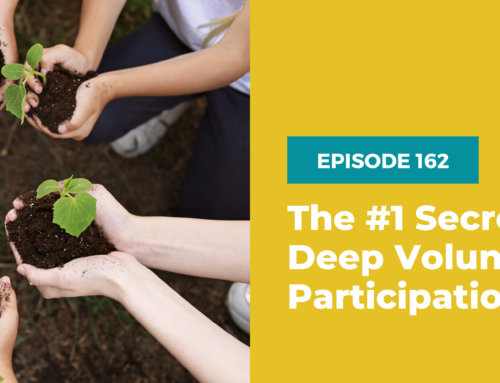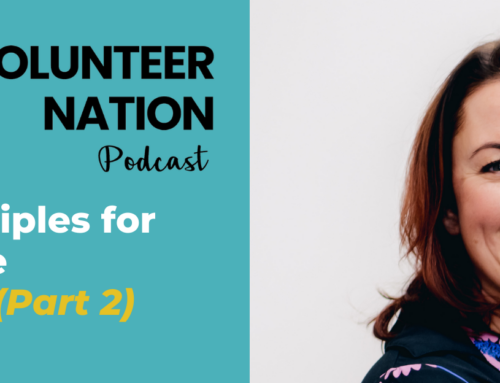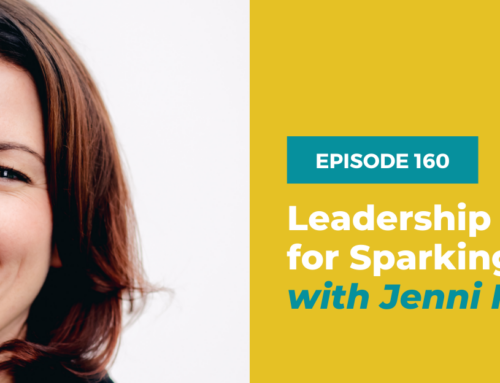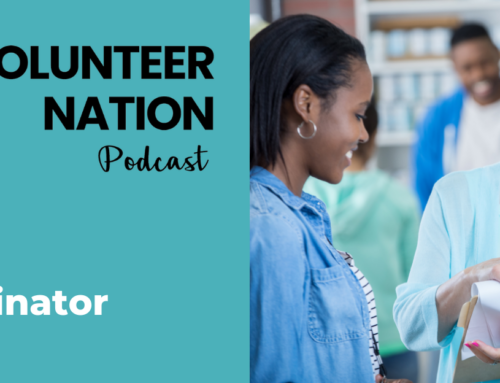
December 19, 2024
Episode #141: 8 Ways to Build Capacity with Volunteer Teams
In this episode of the Volunteer Nation podcast, Tobi shares 8 practical ways to build capacity with volunteer teams. These include leadership development, community engagement, program development and evaluation, and technology and data management, among others.
Tobi also offers advice on setting up and managing volunteer teams, from using advisory groups to building data and reporting teams. The episode aims to help volunteer leaders maximize their organization’s impact by effectively engaging and managing volunteer teams!
Build Capacity – Episode Highlights
- [01:01] – Introduction to Capacity Building with Volunteer Teams
- [02:38] – Understanding Nonprofit Capacity Building
- [04:33] – Eight Types of Volunteer Teams for Capacity Building
- [04:46] – Volunteer Advisory Groups
- [05:45] – Volunteer Welcome Teams
- [06:35] – Volunteer Outreach Teams
- [07:32] – Break and Membership Promotion
- [09:13] – Volunteer Buddy System
- [09:52] – Volunteer Storytelling Teams
- [11:02] – Volunteer Data and Reporting Teams
- [12:37] – Volunteer DIY Audit Teams
- [14:57] – Tips for Building Capacity with Volunteer Teams
Build Capacity – Quotes from the Episode
“Your primary job is to engage others in the work of your organization. It is not to do the work of the organization. It’s called working on your program versus working in your program.”
Helpful Links
- 2025 Volunteer Management Progress Report Survey Link
- Volunteer Management Progress Report
- VolunteerPro Membership Community
- Otter.ai
- Volunteer Nation Episode #80: A Sneak Peek of My New Book for Volunteer Leaders
- Volunteer Nation Episode #135: How to Use Video Storytelling to Connect with Aaron Walton and Emmanuel LeGrair
- Volunteer Nation Episode #018: How to Use Slack to Strengthen Volunteer Teams
About the Show
Nonprofit leadership author, trainer, consultant, and volunteer management expert Tobi Johnson shares weekly tips to help charities build, grow, and scale exceptional volunteer teams. Discover how your nonprofit can effectively coordinate volunteers who are reliable, equipped, and ready to help you bring about BIG change for the better.
If you’re ready to ditch the stress and harness the power of people to fuel your good work, you’re in exactly the right place!

Contact Us
Have questions or suggestions for the show? Email us at wecare@volpro.net.
Rate, Review, & Follow Us on Apple Podcasts
If you love the content Tobi shares on the Volunteer Nation podcast, consider rating and reviewing the show! This helps us reach more people – and help more good causes just like yours – successfully engage enthusiastic, dedicated volunteers with less stress and more joy.
Click here, scroll to the bottom, tap to rate with five stars. Then, select “Write a Review” and let us know what you loved most about this episode!
Also, if you haven’t done so already, follow the podcast so you don’t miss a thing. Follow now!
Subscribe to ProNews: Our Weekly Resource Roundup
If you’d like to stay up to date on all new podcasts, blogs, freebies, and deals posted on our Tobi Johnson & Associates and VolunteerPro websites, subscribe to our weekly ProNews newsletter.
Every Wednesday, we’ll send you a digest of our freshest content, plus a bonus! Once you confirm your subscription, you’ll get our [Free eBook] The New Volunteer Manager: The First 90 Days.
Episode #141 Transcript: 8 Ways to Build Capacity with Volunteer Teams
Tobi: Hello, my friends, Tobi here. Just one quick reminder that tomorrow is the very last day you can participate in the volunteer management progress report survey. This year is our recruitment edition, and we are collecting all kinds of data to report back in January what the trends are. And if you participate in the survey, you will get an exclusive invite to the early results sneak peek webinar in January. So, if you want to get on board, head over to volpro.net and hit the research button tab at the top of the page and join us. I’d like to see you inside and make sure your voice is heard.
Okay, everybody, I would love to talk about capacity building today and specifically through volunteer teams. And what we’re going to talk about is eight ways to build capacity with volunteer teams.
I want to talk about what capacity building is, but also what’s the connection with volunteerism. We often think of volunteerism as the way that volunteers support us through fundraising, direct service. It’s helping with admin, helping with events, but we don’t often think of the connections and ways that volunteers can help with capacity building.
So, I want to give you some ideas and tips around that. You as a volunteer leader probably are tackling many challenges in your job, but I bet having enough time is one of the biggest ones. I know for most of us, we are really strapped for time to get the kinds of priorities and projects we want to get done.
There just never seems to be enough time in the week. But what if you could add time back into your calendar and build capacity for greater impact and do that by engaging volunteer teams to help fuel your growth? And today, I want to share a few ideas on ways to do that. And at the end, I also want to share a few ways to get prepared to use volunteer teams effectively.
Because I know people often think it’s a great idea to use volunteer teams, but they often balk at the idea of trying to get them set up. So, I want to talk about how to do it simply. Okay, so let’s kick it off by what we mean by capacity building. Nonprofit capacity building refers to the process of strengthening your organization’s ability to fulfill its mission effectively, efficiently, and sustainably.
This can involve enhancing your infrastructure, skills, knowledge, and resources to improve your overall performance and impact. Capacity building helps organizations address challenges, adapt to change, and achieve long term success. So, who doesn’t want all that? Organizations can build capacity to meet their mission by engaging volunteers in many, many areas.
Today, I want to focus on four that I feel are the most compelling and probably some of the greatest needs for our organizations. One is leadership development, the capacity building around leadership development. This is enhancing the skills and effectiveness of your board members and other volunteers.
That’s important and volunteers can help with that. Another pillar or avenue of capacity building is community engagement, strengthening relationships with stakeholders, including donors, volunteers, and the communities you serve. So that’s an area that volunteers can have a hand in, in supporting. Another area of capacity building is program development and evaluation by designing and assessing programs to ensure they meet community needs and align with your mission.
So, I think volunteers have a role to play there as well. And, finally, another pillar or bucket of capacity building is technology and data management, specifically upgrading technology and improving data collection, analysis, and use towards improving your results. And I think also volunteer teams can support that as well.
So, I want to talk about eight types of volunteer teams that support one or more of the pillars, these four areas of capacity building that I’ve just shared. So, the first one is volunteer advisory groups, and this is probably one of the most common ways volunteers are involved in capacity building. And what volunteer advisory groups do, often they’ll meet quarterly or twice a year.
And they’ll help build the capacity of the organization to engage volunteers more effectively by offering their direct feedback on the volunteer experience, giving ideas or reflections on proposed changes to the volunteer program. offering up what they feel are the low hanging fruit. There’s lots of ways to work with advisory groups, and they don’t necessarily only need to give you feedback on the volunteer program itself.
If these volunteers are working in direct service, they know a lot about whether your programs are working for the people that they see day in, day out. So that’s one way that volunteer teams can help build capacity. Another way is through a volunteer welcome team, and I am a huge fan of that. fan of volunteer welcome teams.
I talk about them a lot in the volunteer pro community. It’s a way for volunteers to help build the capacity of the organization to attract and retain qualified volunteers. And this really saves you time because you can delegate volunteer screening and onboarding to a team that can. offer, honestly, a more attentive experience to your new recruits.
Because of that attentive experience and that customer service experience, volunteer to volunteer, often it can reduce your turnover because it improves the experience, the quality of the experience. So, volunteer welcome team is another way to build capacity through volunteer teams. A third way to build capacity is a volunteer outreach team.
And this is building the capacity of the organization to connect with new communities. Now this can save you time by delegating speakers and tabling requests as well as the preparation of a team of volunteers that can speak directly through their authentic experiences with your organization. This gives you a lot of credibility in the community and can sometimes be more effective than paid staff who are engaging in outreach events.
And so, this is another way to expand your capacity to reach new communities. Also, volunteers have connections in communities that you may not. And so, they can open doors that perhaps you’ve been trying to open for a long time and just haven’t been successful. So those are three ways that volunteer teams can help build capacity.
After the break, I’m going to talk about five more ways and then give you some tips on how to get started with a volunteer team. All right. So, I’ll be right back.
Volunteer Pro Premium Membership
If you’re enjoying this week’s episode of Volunteer Nation, we invite you to check out the Volunteer Pro Premium Membership. This community is the most comprehensive resource for attracting, engaging, and supporting dedicated high impact volunteer talent for your good cause.
Volunteer Pro Premium Membership helps you build or renovate an effective volunteer program with less stress and more joy. So, you can ditch the overwhelm and confidently carry your vision forward. And it’s the only implementation program of its kind that helps your organization build maturity across five phases of our proprietary system.
The volunteer Strategy success path. If you’re interested in learning more, visit volpro.net/join
Okay, we’re back with my brainstorm of how to build capacity with volunteer teams. I started out with talking about the ways that you might, and the areas where you might involve volunteers in general in capacity building and then talked about three teams.
One was volunteer advisory groups, one was a volunteer welcome team, and one was a volunteer outreach team. But I want to talk about five other places that you could involve by ensuring that new volunteers have someone they can go to when they have questions, and that reduces your volunteer support time. If there is a buddy system or a mentoring system set up, that means there’s less inquiries to paid staff and those peer mentors can often offer Really close to the ground experiences and tips that you don’t do their jobs.
So, you don’t know all the ins and outs. So, they often have some wisdom that they’ve developed on the job that they can share with their peers. Another area of volunteer capacity building where you can build a team. A volunteer team is a volunteer storytelling team, and you can build the capacity of your organization to share its mission moments, both internally and externally, through stories about volunteer impact.
And if you can have volunteers that are collecting these stories, their stories and the stories they collect can help you improve effectiveness. of your communication. Because we all know that communication is more effective when it has an emotional element to it. It resonates more with the audiences we’re trying to reach when there’s an emotional element to it or emotional feeling to it.
And stories are the best way to share emotions. And so, a volunteer storytelling team can build the capacity of your marketing and communications. We had an episode, Volunteer Nation episode 135 recently on how to use video storytelling to connect with Aaron Walton and Emmanuel LeGrair so, if you want to think more and listen and hear and maybe get some ideas around video storytelling and storytelling in general, check that episode out and I’ll link to it in the show notes.
A sixth team that can help you with capacity building is a volunteer data and reporting team. This builds the capacity of your organization to track its results through standardized performance dashboards and reports. Your organization needs to generate accurate data for grants and program reporting.
You need it as a manager to make informed and timely decisions. So, if you have the right volunteer team, a team that likes to crunch numbers and that likes to look at data and likes to track performance over time, this is an excellent team to bring on board. Now, you can even task this team to develop dashboards and report structures for you.
You might just give them the key data elements that you know you need and see if they can come up with ways to create online dashboards or, you know, even paper dashboards or spreadsheets where they can report back to, uh, the organization as a whole or organizational leadership, I should say. So, I think data and reporting team is an excellent way, especially finding folks in the corporate sector, employee from employee volunteer programs who, who do some of this work, number crunching in their jobs.
I think they have a skill set that maybe some of us don’t in terms of. sophisticated number crunching, and so it’s a great team to bring on to build capacity. We often don’t have that capacity inside our organizations. The last volunteer team to help build capacity I want to mention is a volunteer DIY audit team.
Inside the VolunteerPro community, we train and have a DIY audit kit that our members can use to basically delegate an audit or a program evaluation to a team of volunteers. And so, volunteers audit or evaluate their own volunteer program. And I have to say, who is better than the people who are in the program or impacted by the strategy, who better than that group to give you, tell you whether it’s working.
This kind of team can help you build the capacity of the organization to evaluate the efficiency and outcomes of the volunteer engagement. They can also audit or evaluate other programs as well, if you give them a structure and a rubric, a way of looking at or scoring your program outcomes.
This can help you also pinpoint bottlenecks as well as delegate some of the report writing of the evaluation. So, if you have a volunteer who’s good at report writing, this is something that they can help with. So, the DIY audit team isn’t for everybody, obviously. You want to have very well considered volunteers, people who can think critically, people who can be discreet.
Because they may be conducting volunteer surveys or focus groups or other types of data collection, and they need to be very clear about the privacy practices of your organization and those kinds of things. But when done well, and I have trained volunteer teams to do DIY audits, when done well, the organization gains capacity by gaining these insights that they would never really get.
from a staff-led evaluation or an external led evaluation for that matter. So those are eight teams that you might engage around capacity building. These teams are helpful, but they don’t appear overnight either. And it does take time to build them and support them. But once they get going and once you have a structure, these teams, there are often very self-sufficient.
And so, I wanted to give you some tips because you may be hesitant on this point. You may say, I don’t know, that, that just seems like a lot of work. Is it worth it? I have so much to do. Well, think about what your organization will gain if you can set aside a little bit of time to, um, get a team off and running.
You know, I’ve been thinking a lot about volunteer teams and how to equip volunteer teams because I’m writing a book for volunteers who lead. It’s going to come out next year. It didn’t come out this year because I had some flood. If you’ve been listening to me for a while, I had a flood in my house. And didn’t have a place to live for a while, we’re moving around and it pretty much put a lot of projects on hold, but I’m back to it.
And if you want to know more about the book and what’s happening with that book, check out Volunteer Nation episode 80, a sneak peek of my new book for volunteer leaders. Now in that episode, I say the book’s coming out in 2024, but I can tell you it’s, it’s not. We pushed it forward one year.
It should come out next year in spring of 2025. So, if you’re interested, check it out. So, let’s talk about what are the tips for how to build capacity for these teams using volunteer teams. It takes capacity, but it you’re thinking about your own capacity to build capacity, building teams, a bit meta, isn’t it?
It takes a capacity. It takes your own capacity to build. volunteer teams for sure. But it’s really, I think to kick it off properly, it really requires it or may require a mindset adjustment. Your primary job, if you are listening and you’re a leader of volunteers, your primary job is to engage others in the work of your organization.
Your primary job is not to do the work of the organization. Even if you wear many hats, if you’re some part of your job is around volunteer engagement, then when you’re doing that job, it should be the work you should be doing should be around engaging volunteers in the work. It’s called working on your program versus working in your program.
And the more you take, take on tasks within your volunteer program, especially around capacity building, and you take those on rather than delegating them, then the further you get away from your purpose or true purpose as a leader of volunteers. As a leader of volunteers, our true purpose is to engage others in getting the work of the organization done, including capacity building.
Consider capacity building and setting up a team to work on non-profit capacity building at your organization. Consider it to be an investment, at least in the early stages, and I want to give you some tips on how to make that investment pay off. So first off, start small. Start small. Choose one team to get started with.
Don’t try to do three or four or five teams at once. Just choose one team to get started. Make sure when you form that team that you have a super compelling outcome in mind for this first team, that you can imagine the benefits and the quick wins that can happen when this team gets firing on all cylinders.
If it doesn’t have a compelling benefit for you and your organization, it’s going to be hard to invest the time, but if you can see the return on investment and what’s at the end of the rainbow, then you’re going to put some more energy into this. So, you really do have to have a compelling reason for these teams, not just a team for team’s sake.
You want to also create a team description with clear goals and outcomes. You need to clarify exactly what this team will do. Now, it’s sort of like. A volunteer position description, but it doesn’t have to look exactly like that. You want to give them an overview of what it is that the team is when the team is successful, what do the final deliverables look like?
Or what to the, it might be what to the monthly deliverables look like, or the quarterly deliverables look like, or what is. what happens at the end of the project. You also, to kick off a team like this and delegate something that you’ve been doing for a long period of time, you want to document the processes you use so they have something to follow.
Yes, you’re going to spend time orienting people. And folks will say, I don’t have time to orient people. But imagine if you’re doing something on a repetitive basis. If you delegate it to somebody else, in the long run, you’re going to spend less time. You’re going to spend more time up front, but in the long run, because you no longer must take on that task, you will save time.
And so, you need to document processes to make this handover efficient. Now, we’re going to be talking next week. I’m recording this early in December, and next week we’re going to be doing a volunteer pro workshop on developing standard operating procedures for programs. And there’s some things that I’m going to recommend to our volunteer pro members that I’ll also recommend to you now.
One is that you can use, if you’re not a writer and you’re not happy writing and you’re, the thought of writing out standard operating procedures or SOPs is just like, just makes your head explode. Try using a voice transcription service. to verbally create a step by step and you might do it while you might sort of talk through a process while you’re doing it and using something like Otter AI to transcribe it and then you can go back and just edit it down to something really easy for people to be able to follow.
Might be easier than you trying to write. If writing is just not your thing and it’s stopping, you from moving forward. Try some voice transcription platform. Another thing you can do is use AI like ChatGPT to build out your SOPs. And I have been very pleasantly surprised at times where I’ve liked to, I want to see an example of an SOP on something and I’ll go to ChatGPT and say, Build me a standard operating procedure for XYZ, for volunteers, and it’s not that I copy it exactly, but it gives me ideas for things that I’ve forgotten to include in my SOP.
Think about what tools you can use, what technology tools you can use, to make this process a lot easier. You can also, Ask your team members to create their own SOPs, but you’ve got to have very self-starting and volunteers that already really understand your organization fairly intimately if you’re going to give people that much latitude and, and it’s sort of a sink or swim kind of situation, which isn’t my favorite when it comes to delegating.
Because people can get frustrated easily and your work product often isn’t what it needs to be. So, support and training and specific guidelines are required to set a team up for success. So set up a date also to train your, your, on your processes, but give them Also, some time and space to plan.
So, they need to plan how they’re going to attack the project, as well as learning how to, how to do whatever the thing is that you want them to do. And then to keep in touch with your teams, you might see Set up a group chat like Slack, using Slack to keep in touch with your team so you can answer things quickly and you’re not, the team doesn’t get stuck waiting for responses from you.
You can also just kind of monitor how the team is going. You don’t necessarily need to weigh in. You can just see if they’re communicating and they’re moving forward. I have a Volunteer Nation podcast episode 18. This is way back when I first started the podcast. How do you use Slack to strengthen volunteer teams?
And we talked about how we use Slack. So, if you’re wondering how I would use Slack with a specific team or any other messaging software, check that, uh, episode out. It might help. So, those are my tips for getting started with capacity building through volunteer teams. There is so much potential there.
There are probably several things on your to do list that just sit there. They get parked there and you just can’t move forward with them because you’re so enmeshed in the day to day. One of those projects is no doubt, I have no doubt at all, that one of those projects could be an exceptional project for a volunteer capacity building team.
And so, think about it and try out one and just see how it goes. And I’d love to hear. How it goes. So that’s what I got for today. I want to encourage everybody to really expand how volunteers are involved in their organizations. Yes, volunteers are fantastic for fundraising. They’re wonderful at our events.
They are essential to our direct service programs, but they also could be great. critical linchpins to our capacity building efforts, our efforts to improve as our organization’s operations, our efforts to be more efficient, and our efforts to make a bigger impact. And I think volunteers have a huge role to play there if we give them the opportunity to do so.
Thanks for joining me today, happy holidays, and I hope to see you next week, same time, same place, on the Volunteer Nation.






